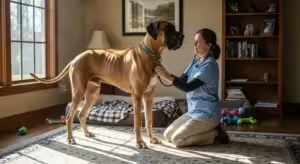People often joke that dogs will grow to resemble their owners, and not just in appearance but also in overall temperament, body language, and personality. Well, a new study published in the Journal of Research in Personality has presented some pretty amazing evidence that our dogs actually are influenced by our personalities.

In the first and largest study of its kind, researchers surveyed the owners of more than 1,600 dogs—who varied in breed, gender, and age—and asked them extensive questions about the behavioral history of both their dogs and themselves.
And get this: The study found that dogs really did match the personality of their owners.
Those who rated themselves as more extroverted also tended to have more excitable and active dogs, and those who were more shy or quiet tended to have dogs that were more wary among strangers. But the correlation between the personality of dogs and owners has often been a bit of a “chicken or the egg” conundrum. Do dogs take on the personalities of their beloved humans, or do people tend to gravitate toward dogs that are more similar to them?
The study’s results indicate that the answer might lean toward the former option. “When humans go through big changes in life, their personality traits can change. We found that this also happens with dogs—and to a surprisingly large degree,”said William Chopik, a social psychology professor at the University of Michigan and lead author of the study.

“We expected the dogs’ personalities to be fairly stable because they don’t have wild lifestyle changes humans do, but they actually change a lot. We uncovered similarities to their owners, the optimal time for training and even a time in their lives that they can get more aggressive toward other animals.”
The internet is full of heartwarming videos that feature abused, aggressive dogs who become kind and sociable once they are brought into a loving forever home. The belief has always been that the dogs are rehabilitated through the process of love and care, but Chopik’s research indicates that part of what might be at work here is that the dog actually assumes the warm and friendly nature of their new owner.
“Say you adopt a dog from a shelter. Some traits are likely tied to biology and resistant to change, but you then put it in a new environment where it’s loved, walked and entertained often. The dog then might become a little more relaxed and sociable,” Chopik said. “Now that we know dogs’ personalities can change, next we want to make strong connection to understand why dogs act—and change—the way they do.”
That being said, Chopik noted that not all personality traits are so amenable to change, and the age of the dog is also significant.

“Older dogs are much harder to train; we found that the ‘sweet spot’ for teaching a dog obedience is around the age of six, when it outgrows its excitable puppy stage but before its too set in its ways,” he said.
So if you’re nervous about adopting an adult dog because you think they’ll be harder to train than a puppy, think again, and don’t forget to lead by example, since your fur-baby is watching you closer than you might think.















